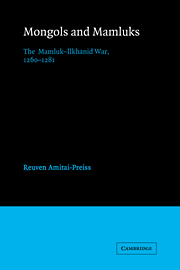Book contents
- Frontmatter
- Contents
- List of illustrations
- Preface
- List of abbreviations
- Notes on dates and transliteration
- Introduction
- 1 The historical background
- 2 The battle of ʿAyn Jālūt
- 3 The formulation of anti-Īlkhānid policy
- 4 The search for a second front
- 5 Military and diplomatic skirmishing
- 6 The secret war
- 7 Baybars's intervention in Seljuq Rūm
- 8 Baybars's posthumous victory: the second battle of Homs (680/1281)
- 9 The Mamluk–Īlkhānid frontier
- 10 Mamluks and Mongols: an overview
- Maps
- Genealogical Tables
- Glossary
- Bibliography
- Index
4 - The search for a second front
Published online by Cambridge University Press: 23 November 2009
- Frontmatter
- Contents
- List of illustrations
- Preface
- List of abbreviations
- Notes on dates and transliteration
- Introduction
- 1 The historical background
- 2 The battle of ʿAyn Jālūt
- 3 The formulation of anti-Īlkhānid policy
- 4 The search for a second front
- 5 Military and diplomatic skirmishing
- 6 The secret war
- 7 Baybars's intervention in Seljuq Rūm
- 8 Baybars's posthumous victory: the second battle of Homs (680/1281)
- 9 The Mamluk–Īlkhānid frontier
- 10 Mamluks and Mongols: an overview
- Maps
- Genealogical Tables
- Glossary
- Bibliography
- Index
Summary
… Between our older and younger brothers, there was conflict. Because of this we could not ride towards you.
Abagha, in a letter to Baybars, 667/1268Early on in the war, both the Mamluk Sultans and the Īlkhāns began to devote considerable efforts to diplomatic activities with various third parties. Both sides hoped that this would lead to the opening of a second front against their enemy, bringing about its weakening and neutralization, if not its defeat. It is true that Mamluk–Golden Horde relations as well as Īlkhānid–Frankish contacts have been well studied by modern scholars. Considering the importance of this subject for the history of Mamluk–Īlkhānid war, however, it is impossible to dispense with a discussion on this topic. It may also prove useful to re-examine the diplomatic relations within the context of the Mamluk–Īlkhānid war.
The beginnings of the Mamluk–Golden Horde entente
The relationship between Baybars and Berke Khan, ruler of the Golden Horde, originated in their mutual understanding that they shared a common enemy in Hülegü. Berke's conflict with Hülegü arose from the latter's occupation of the area south of the Caucasian mountains. It appears that prior to Hülegü's arrival the Jochids had enjoyed some type of vague sovereignty over all of Mongol Iran, which had now been denied them. The studies of Professor Ayalon and Dr. Jackson have shown that this question of sovereignty, along with the related matter of the control of revenues, were the fundamental reasons behind the Īlkhānid–Golden Horde war.
- Type
- Chapter
- Information
- Mongols and MamluksThe Mamluk-Ilkhanid War, 1260–1281, pp. 78 - 105Publisher: Cambridge University PressPrint publication year: 1995

